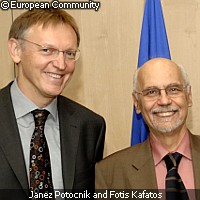European Research Council presents its first conclusions
On 7 October, the European Research Council (ERC) presented a selection of its first starting grant winners at a meeting in Paris, France, and reflected on its successes and challenges over the past three years. The ERC's achievements, especially in fostering pan-European competitiveness, have been significant. The ERC's success was praised roundly, and its swift, efficient implementation was welcomed by CNRS (the French scientific research centre) Director General Arnold Migus, and Gilles Bloch, Director General of Research and Innovation at the French Ministry for Higher Education and Research. In choosing its starting grant laureates, the ERC followed three principles: 'trust the young, trust the individual, and keep it simple'. The starting grants give scientists the opportunity to become independent early in their careers, and are designed to give researchers 'total flexibility, to do what makes sense for the individual to do his best work', according to ERC Scientific Council Chairman Dr Fotis Kafatos. The laureates at the meeting were extraordinary people conducting frontier research; the ERC grants will give them five years to concentrate on their work without having to look for funding. They all put forward suggestions for streamlining the application process, but were overall very happy with the ERC, its mission and the possibilities it opens for them to perform at their best. ERC grants are unique in that they are portable. Because the money is given to the individuals and not to the institutions where they work, the scientists are free to choose where they want to conduct their research. This puts pressure on institutions to modernise and provide the right environment for its researchers, and it also creates a situation in which institutions (and nations) compete over the winners. In his speech, Dr Kafatos emphasised that the ERC 'is funding internationally, not nationally. It is the responsibility of the nations to create the right environment'. In particular, the organisation hopes to do more to make Europe the world leader in scientific research by encouraging EU nations to dedicate higher percentages of their gross domestic product (GDP) on research and development. Although grants were awarded in 21 countries, the geographic distribution is quite uneven, reflecting the quality of the research environment in each of the host nations. 'There was never meant to be a geographic distribution,' explained Dr Kafatos. 'It is very encouraging that scientific excellence is as widespread as it is. As countries increase their research and development (R&D) budgets, the geographic distribution will likely be more level.' Commissioner Janez Potocnik added, 'Europe is in serious competition with the rest of the world.' The ERC, he added, is sending a 'strong signal that we have to do our best at home, to modernise our systems and make the changes that are needed' to keep the best people. Mr Bloch commented: 'It is up to each nation to take care of its research system. [...] Each country is under pressure now to make its system equal'. There were over 9,000 applicants for the ERC's starting grants, and due to budget limitations the organisation was not able to award grants to as many researchers as they would have liked. 'As many [applicants] as were accepted also deserved a chance,' said Dr Kafatos, adding that national initiatives supporting the runners-up are extremely important, as is sending the message that countries value their scientists. A number of other speakers reiterated this point throughout the meeting. According to Dr Kafatos, 'We had more than 3,000 applicants from Italy because they didn't have the support they needed from home. Greece is another example; it hurts me to say that. [Research] has to be cultivated. If you don't modernise, you lose talent; you won't capture the enthusiasm.' The objectives of the ERC are to 'recruit, repatriate and retain' scientific talent. Its efforts to encourage researchers to move to Europe have met with limited (5%) success in the first year, but according to Dr Migus, 'This was the first year: people didn't know what the process was going to be. In the next round, we expect to see more applicants from abroad.' Commissioner Potocnik agreed, adding: 'Time and the instrument are on our side.' The sole criterion of the ERC evaluation process is excellence, a point lauded by many speakers at the conference. Many of the starting grant recipients were women, but a disproportionate number of the advanced grant recipients were men. According to Dr Kafatos, this issue is important to the ERC leadership. 'It's important for Europe to take advantage of our excellent people without losing the talent of the women,' he commented. 'We have well-qualified women serving on the evaluation panels and have mechanisms to encourage women to apply,' Dr Kafatos told CORDIS News, pointing out that the lower representation of women among the advanced grant laureates is likely due to the historical position of women in science. While the ERC strongly encourages women to apply for these grants, it is important to note that the organisation 'has no quotas whatsoever', added Dr Kafatos. The work of the laureates is evaluated annually and improvements are constantly being made to streamline the application and funding processes. 'We need to streamline procedures, and to have more operational autonomy, and not just in the scientific domain,' Dr Kafatos said in his speech. 'The Commission is prepared to do that. We need to make sure this hope materialises.' In a question-and-answer session, Dr Kafatos commented on the evaluation process: 'We are experimentalists: we don't believe the first time is the last time.' The ERC leadership will meet in mid-October to discuss specific strategies to improve the organisation's operations.
Countries
France



